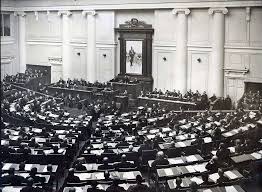Nuclear Reactors 554 - Russian Duma Considering A Bill To Cut Off Nuclear Trade With U.S. Companies
Last year, Congress passed a tough sanctions bill against Russia and Russian oligarchs in retaliation for their interference in our 2016 elections. The Trump administration refused to implement the sanctions until the political pressure made them impossible to ignore. On April 6, Trump finally implemented the sanctions on twenty-four government officials and powerful Russian businessmen.
The State Duma, the lower house of the Russian legislature, is now considering the draft of a bill to ban all trade between Rosatom, the Russian state-owned nuclear monopoly and all U.S. nuclear power companies. The bill was submitted jointly by several of the factions in the Duma and Vyacheslave Volodin who is the chairman of the Duma. It could be debated and might be adopted in the next Duma session this week.
Beginning in 2016, Volodin has been the personal target of sanctions. He is a member of President Putin’s inner circle. His assets in the U.S. were frozen in reaction to the Russian annexation of the Crimean Peninsula. The European Union also hit him with travel-restriction and sanctions.
In addition to the stopping of trade with the U.S. nuclear power industry, the bill would also impose restrictions on software, hardware, pharmaceutical and farm products exported from the U.S. to Russia. The U.S. would also be prohibited from joining in the privatization of Russian state-owned assets. In addition, the bill sets up similar restrictions that would be imposed on any other countries who followed the U.S. lead in sanctions against Russia and Russians.
Rosatom currently has multiple projects with companies in the U.S. TVEL is Rosatom’s nuclear fuel division. In April of 2016, TVEL signed a contract to deliver test batches of its TVS-K fuel rod assemblies to pressurized power reactors in the U.S. starting in 2019.
It is unclear just how damaging such a freeze of nuclear trade would be. The most important nuclear exchange between the U.S. and Russia was the Megatons to Megawatts program which ended in 2013. This exchange agreement was signed between the U.S. and Russia in 1993, shortly after the collapse of the Soviet Union. The U.S. purchased low-enriched uranium from Russia which was created by diluting highly-enriched weapons grade uranium which was in excess of what Russia needed for their nuclear weapons program.
The Megatons to Megawatts program ultimately converted five hundred tons of weapons grade uranium into fifteen thousand tons of nuclear fuel grade uranium for use in U.S. nuclear power reactors. This program was called the greatest disarmament program in the history of the world. We got cheap nuclear fuel to burn in our reactors and Russia made a seventeen billion dollar profit.
After the ascension of Vladimir Putin to the presidency of Russia, Rosatom began to complain that the Megatons to Megawatts program was forcing Russia to sell their uranium fuel to the U.S. at a price below other sources of uranium fuel. After 2013, Rosatom wanted to sign nuclear fuel import contracts with the U.S. for uranium that would be priced at the current level of world nuclear fuel prices.
Russian Duma:
